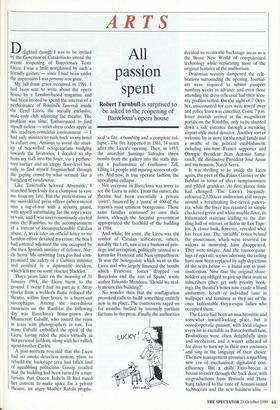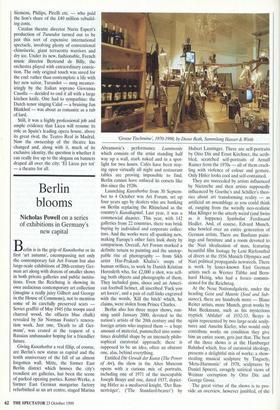ARTS
All passion spent
Robert Turnbull is surprised to be asked to the reopening of Barcelona's opera house Delighted though I was to be invited by the Governor of Catalonia to attend the recent reopening of Barcelona's Teatr Liceu, I was a little nonplussed by such a friendly gesture — since I had been under the impression I was persona non grata.
My fall from grace occurred in 1991. I had been sent to write about the opera house by a London-based magazine and had been invited to spend the interval of a performance of Rossini's Tancredi inside the Cercl Liceu, the socially exclusive, male-only club adjoining the theatre. The problem was time. Embarrassed to find myself tieless — strict dress codes apply in this tradition-conscious environment — I had only minutes to rush back to my hotel to collect one. Anxious to avoid the snarl- up of bejewelled octogenarians trudging towards the lavatories, I decided to slip from my stall into the foyer, via a perfunc- tory barrier and an empty floor-level box, only to find myself frogmarched through the gaping crowd by what seemed like a battalion of carabineros.
Like Tancredi's beloved Amenaide, I searched hopelessly for a champion to save me from my fate. But the protestations of my mini-skirted press officer (who entered into a tug-of-war with a security guard, with myself substituting for the rope) were in vain, and I was unceremoniously ejected onto the Ramblas, to the accompaniment of a torrent of incomprehensible Catalan abuse. A week later an official letter to my London editor detailed my crime: the box I had entered adjoined the one occupied by the then Spanish minister of defence, Nar- cis Serra. My unwitting faux pas had com- promised the safety of a Cabinet minister and resulted in a diplomatic incident, which left me on some obscure blacklist.
Three years later on the morning of 31 January 1994, the Liceu burnt to the ground. I swear I had no part in it. Stray sparks from a welder's flame reduced the theatre, within four hours, to a burnt-out sarcophagus. Among the incredulous mourners on the Ramblas the following day was Barcelona's home-grown diva Montserrat Caballe, who toured the ruins in tears with photographers in tow. For many Caballf embodied the spirit of the Liceu, having ruled the place virtually as her personal fiefdom, along with her raffish agent-brother Carlos.
A post-mortem revealed that the Liceu had no smoke-detection system; plans to rebuild the backstage area had fallen foul of squabbling politicians. Gossip recalled that the building had been cursed by a nun: furious that Queen Isabela II had razed her convent to make space for a private theatre, an angry Mother Rafols prophe-
sied 'a fire, a bombing and a complete col- lapse'. The fire happened in 1861, 14 years after the Liceu's opening. Then, in 1893, the anarchist Santiago Salvador threw bombs from the gallery into the stalls dur- ing a performance of Guillaume Tell, killing 14 people and injuring scores of oth- ers. And now, in true operatic fashion, the apocalyptic collapse.
Not everyone in Barcelona was sorry to see the Liceu in ashes. From the outset, the theatre had been essentially a private 'court', financed by a 'junta' of 400 of the region's most eminent bourgeoisie. Those same families continued to own their boxes, although the Socialist government appropriated the freehold of the building in 1984.
And while, for some, the Liceu was the symbol of Catalan self-esteem, others, notably the Left, saw it as a bastion of priv- ilege and corruption, politically tainted as a haven for Francoist and Nazi sympathisers. 'It was the bourgeoisie which went to the Liceu and who largely financed the bombs which Francoist forces dropped on Barcelona and the rest of Spain,' wrote author Eduardo Mendoza. 'Should we real- ly mourn this building?'
No wonder then that the conflagration provoked calls to build something entirely new in its place. The controversy raged on for months, fuelled by intensely partisan factions in the press. Finally the authorities decided to recast the backstage areas as a the Brave New World of computerised technology while replicating most of the original features of the auditorium.
Draconian security dampened the cele- brations surrounding the opening. Journal- ists were required to submit passport numbers weeks in advance and even those attending the dress-rehearsal had their secu- rity profiles vetted. On the night of 7 Octo- ber, unaccounted for cars were towed away and police leave was cancelled. Come 7 p.m. lesser mortals arrived at the magnificent portals on the Ramblas, only to be shunted down a side entrance through a menacing airport-style metal detector. Another sort of welcome lay in store for the royal family and a swathe of the political establishment, including one-time Franco supporter and Olympic President Juan Antonio Sama- ranch, the diminutive President Josd Aznar and my nemesis, Narcis Serra.
It was thrilling to be inside the Liceu again, the peer of the Palais Gamier or the Bolshoi in terms of sheer sumptuousness and gilded grandeur. At first glance little had changed. The Liceu's burgundy- coloured 2,320-seat auditorium still sweeps around a breathtaking five-tiered panora- ma, while the foyer has retained its simple checkered green and white marble floor, its balustraded staircase leading to the daz- zling hall of mirrors or Salon de Los Espe- jos. A closer look, however, revealed what has been lost. The 'invisible' boxes behind the proscenium, which were reserved for widows in mourning, have disappeared. They were unique. And the rococo paint- ings of operatic scenes adorning the ceiling have now been replaced by ugly depictions of the seats below — a banal sop to post- modernism. Now that the original share- holders are obliged to give up their seats to subscribers (they get only priority book- ing), the theatre's boxes now exude a bland uniformity, bereft of individual taste in wallpaper and furniture as they are of the once fashionable Goya-esque ladies who occupied them.
The Liceu had been an anachronistic and somewhat inward-looking place, but it oozed operatic passion, with local claques every bit as excitable as Barca football fans. Productions were often delightfully dotty and incoherent, and it wasn't unheard of for divas to turn up in their own costumes and sing in the language of their choice. The new management promises a sparkling new era of mechanised, digitalised cost- efficiency. But a chilly Euro-breeze is bound to enter through the back door, with co-productions from Brussels and Ham- burg tailored to the taste of Armani-suited technocrats and the new business elite —
Siemens, Philips, Pirelli etc. — who paid the lion's share of the £40 million rebuild- ing costs.
Catalan theatre director Nurla Espert's production of Turandot turned out to be just this sort of expensive international spectacle, involving plenty of conventional chinoiserie, giant terracotta warriors and dry ice. Under its new, fashionable, French music director Bertrand de Billy, the orchestra played with extraordinary convic- tion. The only original touch was saved for the end: rather than contemplate a life with her new suitor, Turandot — sung mesmer- izingly by the Italian soprano Giovanna Casolla — decided to end it all with a large kitchen knife. One had to sympathise: the Dutch tenor singing Calaf — a bruising Jan Blinkhof — was about as romantic as a tub of lard.
Still, it was a highly professional job and ample evidence that Liceu will resume its role as Spain's leading opera house, above its great rival, the Teatro Real in Madrid. Now the ownership of the theatre has • changed and, along with it, much of its exclusive identity, the question is whether it can really live up to the slogans on banners draped all over the city: 'El Liceu per tot' — a theatre for all.



















































































 Previous page
Previous page